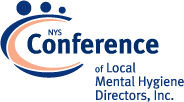NYS Conference of Local Mental Hygiene Directors, Inc. | An Affiliate of the New York State Association of Counties >
Hot Topics / Priority Issues
National Council on Behavioral Health Releases Report: 'Integrating Housing with Treatment Improves Outcomes'
States and communities can improve services and outcomes for people with substance use disorders (SUDs) by integrating housing with treatment and recovery support programs, according to housing, homeless and SUD treatment experts who convened for a frank dialogue on new service approaches for this population. The National Council on Behavioral Health and CSH highlight that and other recommendations in a report released today: The Substance Use and Housing National Leadership Forum.
“Over the past decade, addiction treatment providers across the U.S. have shifted to treatment plans focused on self-management skills with a goal of lifelong recovery,” said Becky Vaughn, National Council Vice President of Addictions. “There also is growing knowledge that housing status is a determinant of all health, and we need to ensure those seeking treatment for SUDs have access to both to underpin their stability and progress.”
Janette Kawachi, CSH Director of Innovations and Research and Vaughn’s co-author of the report, noted: “Medicaid expansion, health homes and other initiatives arising out of the Affordable Care Act (ACA) are creating unprecedented opportunities to finance integrated models of housing and recovery support services for individuals with substance use disorders. ACA provisions have expanded Medicaid to provide benefits for individuals with low incomes experiencing homelessness and SUDs. All of this is moving the discussion on integration forward.”
In addition to key recommendations for policymakers, the report features observations on:
- Opportunities and challenges facing the integration of housing, treatment and recovery support, including finding a common vision, aligning goals and securing funds/adequate resources
- Promoting housing as a platform for recovery
- Understanding and establishing the evidence, including defining, disseminating and making evidence accessible
- Ensuring community involvement in future research and outcome measures
The Leadership Forum indicated that integration proponents must build the evidence base around housing models and best practices to serve individuals with substance use disorders and their families, and work with community partners to disseminate knowledge more broadly.
Download the report: Substance Use and Housing National Leadership Forum.



